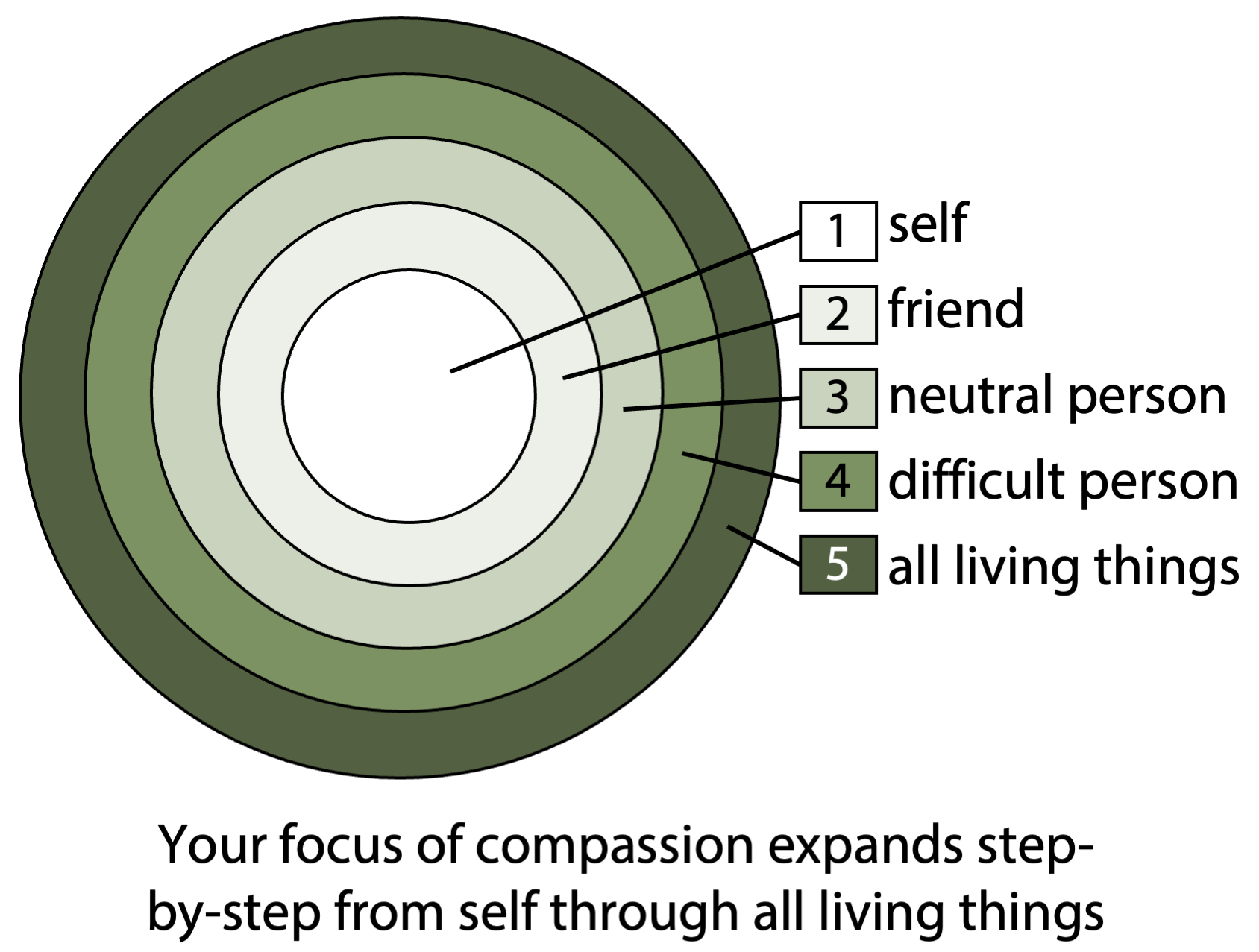Guest blog by Carrie Heeter, PhD, Professor Emeritus, Michigan State University
Scientists found that doing an ancient Buddhist loving-kindness meditation five days per week for three months resulted in improvements in seven aspects of psychological distress.
What is the Buddhist loving-kindness meditation?
Loving-kindness meditations consist of a series of affirmations you repeat silently. At first the affirmations are about yourself:
May I be safe.
May I be happy.
May I be healthy.
May I live with ease.
After some time, you are guided to imagine a friend or family member you are close to, and you repeat the affirmations for them.
May you be safe.
May you be happy.
May you be healthy.
May you live with ease.
The focus of compassion continues to expand. After some time, you are asked to imagine a neutral person—a stranger or someone you do not have strong feelings about.
May you be safe.
May you be happy.
May you be healthy.
May you live with ease.
And then the affirmations shift to a difficult person—someone you have challenges with or dislike.
Finally, the affirmations focus on all sentient beings on earth. May they be safe… happy… healthy… live with ease.

Mindfulness-Based Stress Reduction programs include loving-kindness meditations as part of the 8-week curriculum. Meditation and compassion scientists have used recordings of this meditation in research.
To viscerally understand the meditation experience that the study is based on, try it. Of course, doing this meditation at a Buddhist monastery led by your teacher would be more meaningful than listening to an internet recording. Doing this meditation regularly over many months rather than just once would give time for your experience to evolve and for long term benefits to appear. Trying it once would be more enlightening than never trying it.
These seven psychological distress measures improved.
Eighty study participants answered 68 questions about psychological distress before and after three months of loving-kindness meditation. Seven of those 68 measures showed moderate improvement, likely caused by doing the meditation.
- There was lower trait anxiety. Participants were less likely to feel worry or unease in situations where there is no apparent threat. Affirmations about being safe, happy, and healthy may have helped.
- There were fewer Cardiovascular complaints such as chest pain, heaviness, or palpitations after doing the meditations. Perhaps if there is less worry, the heart may be less stressed. Or else symptoms are less worrying.
- Participants reported less Machiavellian behavior such as lack of empathy or being deceitful and manipulative. Perhaps time spent in meditation expressing kindness toward friends, strangers, and difficult people brought about some empathy in those who lacked empathy.
- Other findings seemed to be less directly associated with loving-kindness. Attention issues improved—participants were somewhat less likely to fail to notice details, be distractible or impatient. And participants were somewhat less impulsive—less likely to act without thinking first such as interrupting conversations.
Why might loving-kindness meditation help with attention? Doing this meditation requires a lot of attention—you change focus each time the affirmation shifts to a wider circle of kindness. Revisiting the experience across 60 days exercises attention.
- The final two changes suggest improvements in reactivity. Participants reported somewhat lower emotional reactivity—they felt strong positive and negative emotions less often and less intensely. And they reported somewhat less sensory sensitivity—they were less acutely aware of different senses (sight, sound, touch, taste, smell, and pain) and reacted less strongly to those sensations.
Not everyone experienced these changes.
These results mean that the average of all participants’ answers after doing the meditations was lower than the average of their answers before doing the meditations. Not everyone improved. Some got worse. But on average loving-kindness meditation was associated with improvements in psychological distress.
So what?
Should we all just do loving-kindness meditations? I’d gladly live in a world where everyone meditates on kindness. (But let’s not ignore endless other fruitful meditations.)
I love how the psychological distress improvements associated with loving-kindness meditations in this research extend beyond being more compassionate. These meditations improved physical and emotional reactivity and cardiovascular issues—elements that don’t seem directly tied to compassion. They improved attention. Fascinating!
This study shows the power of meditation to help mitigate psychological distress. It does not mean that all meditation should be loving-kindness.
Breath counting and body-scan meditations improved 5 different measures of psychological distress.
Eighty different study participants did breath counting and body-scan meditations, completing surveys before and at the end of the study. Scientists were surprised to discover that loving-kindness meditation and breath and body meditations helped with separate aspects of psychological distress. The changes found from breath and body meditations were small, while changes from loving-kindness were moderate.
- Doing breath counting and body-scan meditations slightly reduced how much stress participants reported due to work demands. These meditations also slightly reduced stress due to social overload and stress due to lack of social recognition.
- Feelings of helplessness when you are in pain can influence your experience of pain, your level of disability, and depression. Doing breath and body meditations reduced pain helplessness.
- These meditations also improved how well participants could tolerate uncertainty.
Connecting with present moment bodily sensations during meditation engages attention with what is actually happening. Doing this repeatedly over 3 months helped to reduce feelings of overload from work and social demands. Pain seemed a bit more manageable. Uncertainty felt a little less disturbing.
This study shows that different kinds of meditations yield different kinds of benefits.
Viniyoga would not recommend that everyone do loving-kindness meditations.
Viniyoga adapts the yoga and the meditation to the person.
In Viniyoga possibilities for meditation objects are limitless. If you do yoga practices that include meditation you know from personal experience how much where you place your attention during meditation matters. Meditating on a mountain stream might feel cleansing. Meditating on a large vibrant tree might help you feel stable and grounded. Perhaps meditating on a giant eagle feels expansive and free.
The loving-kindness meditation can be calming, uplifting, and activate deep feelings of compassion. But that meditation is not ideal for everyone to do. For example if you are struggling with feeling safe, repeating the affirmations “may I be safe” could trigger distress and rumination about not feeling safe. SIlently repeating affirmations about a difficult person could activate thoughts about how and why that person is so difficult.
Viniyoga practices—including meditations—are personalized and supported by your mentor or yoga therapist who helps choose a meditation object that is right for you right now.
Dig deeper.
HERE is a 20 minute version of the loving-kindness meditation led by Dr. Aisha Holder at Columbia University. She uses a script developed by Dr. Kristin Neff, a self-compassion researcher at University of Texas at Austin.
This research article described here is open access— you do not need university library credentials to read it. For clarity in the blog I simplified explanations.
Liebmann C, Konrad AC, Singer T, Kanske P. Differential reduction of psychological distress by three different types of meditation-based mental training programs: A randomized clinical trial. Int J Clin Health Psychol. 2023 Oct-Dec;23(4):100388.
Looking for more?
Yoga for Meditation explores the way different Yoga techniques shape the experience of meditation. Each month is dedicated to a specific set of Yoga techniques (movement, breath & sound) and paired with a particular focus of meditation for the entire month. Each month is a new, in-depth exploration of the relationship between Yoga, its tools, and Meditation.
This course is for:
- People who want to feel centered and grounded by a regular meditation practice
- Yoga students wanting to expand their practice experiences
- Yoga Teachers looking to deepen their understanding of meditation
- Anyone looking to grow with a community of like-minded meditation students and an experienced teacher
- Spiritual seekers

Carrie Heeter, PhD, RYS200
Carrie Heeter, PhD, RYS200, is a meditation designer, research scientist, and author of the book An Inside Look at Meditation: Experiences for healing, support, and transformation. She has studied yoga one-on-one with her mentor Marcel Allbritton and participated in Yoga Well courses and trainings for more than a decade. She is a retired professor of interactive media and serious games at Michigan State University



